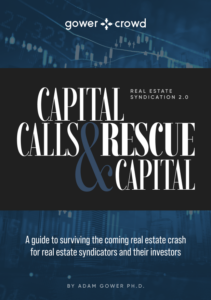Jason Chudoba, Partner at ICR Inc.
Effective Online Communications During Tumultuous Times
 Today's Guest Jason Chudoba
Today's Guest Jason Chudoba
How do you effectively communicate with your clients and prospects in a time of uncertainty and crisis? This is the central question I explore today with my guest, Jason Chudoba, Partner at ICR Inc.
This podcast is a must-listen-to as you navigate your way through this Coronavirus pandemic and relevant no matter what your business. You'll learn how to position your communications with clients, customers and investors so you can continue to build your reputation even during tumultuous times. Together, Jason and I explore how to tailor your messaging for the various segments of your audience, how to remain sensitive to your clients’ concerns, and the overall best practices for communicating during the COVID-19 crisis.
What You're Going to Learn
- Crisis Communication in the Absence of Facts, Communicate the Process
- Delivering the Appropriate Message on Social Media During a Crisis
- How to Tailor Your Crisis Messaging to Different Segments of Your Audience
- Communicating with Sensitivity During a Crisis
- Best Practices for Email Communication During a Crisis
- Making Shifts in Your Email Cadence During COVID-19
- The Risks and Rewards of Video as a Communication Method
- The 3 Worst Things You Could Do for Public Relations During the Coronavirus Crisis
- And much more!
Listen To or Watch the Full Podcast Here
Show Highlights
Crisis Communication in the Absence of Facts, Communicate the Process
Adam: What is the best way of adjusting one's communication, particularly online, in this particular crisis that we're in now, now or in any kind of crisis?
Jason: Sure.
Adam: But we're focusing on this one as a case study.
Jason: Yeah. No, it's, it really is unprecedented times right now, Adam. We're seeing it on a day to day basis with our clients. And I think, what is undeniable is the magnitude and severity of this events' and the impact on the commercial real estate industry is yet to be seen. We're already seeing certain segments of commercial real estate market being hit a lot harder than others. In particular, you have the lodging space and the retail sectors right now which are really feeling the brunt of the social distancing and the travel restrictions as well as, you know, some of the challenges dealing with development projects. You know, these capital intensive projects, you know, are going to be put on pause and being looked at differently as the market continues to fluctuate. Concerns related to capital are factoring into decisions. So companies now are, in a heightened state, in terms of how do they communicate with their stakeholders in terms of what they need to know about our business. And, you know, this is not easy because you don't have all the answers. And with any crisis situation, you know, in the absence of facts, you have to do your best to communicate the process. And whenever you put yourself out there and you're going to communicate with your constituents, there's a lot of things you need to factor in the equation when there are those unknowns in the marketplace. What are you okay with the market knowing? What are you hesitant to put out there that you can't take back? So it's a big responsibility and we spent a lot of time working with clients to really think about how to do that. You know, I think what's universal with all crisis situations is, you have to be very mindful of who you're speaking to. Multiple clients have different audiences and some may require different forms of communication, different tonality, different messages. So you really need to factor that into the equation.
Delivering the Appropriate Message on Social Media During a Crisis
Adam: So let's talk about the specifics of how to communicate. So there's a couple of things that are on my mind, particularly. One is, first of all, do you yank all your usual social activity? Right? So, for example, I have this insane stream of high value social media, how to project your company's presence online. Six or so posts, every single day, go out. I've actually pulled, stopped it completely because it seems insensitive to what's going on. Yet, some of my clients, look, they think that, they're confident that the world will turn back again. That we will recover. And so they want to stay the course and inject C-19 related, or crisis related communications. What are you seeing your clients do and how are you advising your clients in that regard?
Jason: Yeah. And Adam, I wish there was a universal answer for this, but really, it's situational. Again, different segments, different types of companies are being impacted more than others. And really, what a crisis is, it's forcing you to operate in a non-business is normal environment. And the challenges associated with that are robust. You're right. You can absolutely come off as tone deaf or insensitive to the situation. And, you know, perception is reality in these cases. So, you know, if you're continuing to put messages out there in the marketplace, every time you do that, you're taking a bit of a risk. So with our clients, we've told them, you know, you have to really understand what your audience expects of you and you need to put yourself in the shoes of the individuals you're speaking with. So in many cases, it's not let's absolutely suspend our social presence or the way we'd normally communicate with these audiences. But let's think about it a little bit differently. Right? Let's maybe pull back the frequency of that communication. Let's think about the messages we're trying to offer up. Right? Is it, if your traditional social engagement or other engagement is more sales oriented. Right? You don't want to be seen as as you're trying to capitalize on a situation where people are suffering. In the magnitude of that suffering,
And how people deal with that, is different on all levels. So you want to make sure the content that you're putting out there is tactful. It is going to be perceived as being of value to the audience. So, for instance, you have hospitality operators out there, some clients of ours, where you're working to maintain an image of a property, right? There's people running through the sand, there's people hanging out at a pool, during times like this, that's really not the type of messaging you want to get out there. So how do we pull that back and how do we still engage and help people understand what we're doing? So it's you know, we're open for business, here are all the things we're doing to keep our environment safe, to protect our employees. If you need more information on our travel, go here. It's about directing them to the places where they need to go to get answers to their likely questions. But again, all situations are different and all companies have their own risk profiles. So it's about being able to understand that and give the right counsel.
How to Tailor Your Crisis Messaging to Different Segments of Your Audience
Adam: I do want to talk about this idea of capitalizing. This question that you brought up, capitalizing on suffering. And one of the things that I remember, from the last downturn, was that after the initial wave of shock and horror had engulfed the market, remember, it was completely different. It was a financial crisis last time. Let's hope it doesn't bubble into that this time. But once that had died down, there came along a wave of increasingly confident opportunistic messaging. Right? This is a good time to buy. And I'm already beginning to see that, right, in commercial real estate. People are slowly beginning to feel confident that it's okay to say this presents a good buy opportunity. I'm glad I've got dry powder. Line up behind me because this is going to be a good opportunity. So, how do you, if that is your point of view, and that is what you want to put forward, right? That you do have this once. How do you articulate that?
Jason: Yeah. So you're right. Anyone who tells me that they know with certainty that anything is going to be the right thing to do at this point in time, you know, would make me pause and really think about just how sure this individual is with the recommendation. Nobody has a crystal ball. Right? So I do think you need to be thoughtful in terms of how you frame that opportunity. So you're right. You know, you might be operating in a business that is, is not being materially impacted from an operational standpoint as it relates to all the challenges associated with COVID. And you might be able to offer some real value to a certain constituent, whether it's raising capital to, you know, to take advantage of buying opportunities in the market. Interest rates or lower. What does that mean? How do we go ahead and make sure we're putting our investors capital to good work. So you instill, you know, work to find ways to do that. I think the key here, though, is how you present that information to the marketplace. Right? So it's, you know, being mindful that there is, you know, significant disruption in the marketplace.
We understand, you know, you're going through certain challenges in your own business when you evaluate how to allocate capital or where and why you want to do that. And we know, on individuals, for instance, that are using crowdfunding platforms, in particular, to build the real estate portfolios. When thinking about an individual versus an institution, there's a big difference there. If I could say, where institutions are dealing with lots of money and have significantly more experience investing through real estate cycles and economic cycles. You have an individual investor who, you know, is working to put their hard earned capital to work. So when you're talking to the different audiences, you need to be mindful of that. With an institutional investor, obviously, you could be more sophisticated in how you deliver that message and doing that in a way that says, you know, here's something that, you know, we can talk about when the time is right for you. We've identified opportunities. We want to be respectful of what you're going through but we also want to make sure you're aware of what we're seeing in the marketplace and how we think we can help you.
Communicating with Sensitivity During a Crisis
Adam: What are the kinds of responses that you're seeing commercial real estate sponsors doing? You've mentioned that it's very much individual company and individual person related. Right? How they choose to communicate. Whether they yank all their social media activity, whether they continue it, whether they send emails, for example, to their databases. So what are you seeing is the variety that companies are electing?
Jason: You know, I think one piece of advice I give the listening audience here is, during times of crisis situations, people often feel paralyzed and want to pull back from how they'd normally communicate. That can be equally as detrimental than communicating on a more frequent basis. Right? It shows, you know, you're not doing enough to get in front of your audiences to let them know how this is impacting business. So, I would encourage people to be very mindful of that. Companies are operating differently, right? For instance, you'll have some landlords where, you know, in the retail space in particular, where their businesses are being really impacted, you know, in terms of having to close, delaying their expansion plans, landlords pulling back on, again, development plans. So, some of the retail landlords we're looking at, how do we communicate with tenants, right? And how do we do this in a way where it's going to be OK? You know, we're going out there saying something that we're okay and able to live with. The first thing you think about is, hey, are you gonna give me a rent reduction? I think in many cases, it's probably too early to tell. So you really want to be very careful in terms of what you're communicating to your constituents because once you put something out there, or once you offer something to somebody and not somebody else, therein lies problem. So consistency in communication is really important.
I think, you know, helping your audiences understand that you're aware of the situation, you understand the impact that this is having on your business. If you have any questions, you know, please contact us. We'll help talk you through the situation. I think in any event, you know, you really want to try, where it makes sense to take these conversations off-line, especially on the social realm, but also when it comes to communicating via email, right? If you can get on a phone call, in some instances, it might be more personable in helping you understand the true situation that somebody is going through. And at the end of the day, these landlords might not be able to commit to doing something, but at the very least, you know, their tenant feels like they've been heard and they're aware of the situation. You know, in other cases, it's you know, it's more of a communication of: here are all the things we are thinking about and all the things that we are aware of. You're seeing publicly traded companies, right now, issue communications as it relates to dividends, the suspension of guidance, how our business is being impacted by COVID. You're seeing REITs put communications out there, even after having recent earnings calls, in terms of how they're looking at their financial profiles and their projections and their guidance. So all things to think about.
Best Practices for Email Communication During a Crisis
Adam: I'm just going to continue this line. if you're going to structure an email. So you start with an acknowledgment of what's going on. Move on to how you are actually dealing with all these issues, that kind of the ways that it's impacting what you're doing and how you're reacting to that. And then, this is how I've been trying to figure out how to formulate emails for myself and also for clients. Then to wrap up with a look forward, which is, where you can kind of tie back this idea perhaps of optimism if you have, if you think we're going to go off to the edge of a precipice, that's fine, if that's what you think. But presumably, you want to stay in business and you want people around you to believe that the world is going to keep on going.
Jason: So I think I think you're going down the right path. On the end part about the optimism looking forward, I would caution anyone to be measured in how they communicate that, because, again, we don't know and we don't want to pretend that we know. We don't want to speculate or predict anything where we'd have to pull back in the end. At the end of the day, people want to know that you're paying attention to what's going on. They want to know that you continue to prioritize them. They want to know that you have a plan in place and they want to know that you're taking all the necessary steps to protect your business, have it ensure that it can function during and after disruptive events. And then, what these individuals can expect from on a go-forward basis. Is our business changing the way we're operating? Right? And if so, here are the ways we're changing. And here's how you can consider engaging with us.
Right? So think things like that. The other situation you might want to think about is, you know, if the method of communicating has changed.
Don't expect to see regular emails from us or don't expect our phone lines to be open because we're having an exceedingly high volume of calls. The quickest way to get in touch with us and learn how we can help you through this situation because we're all in this together, please contact us the following way. You have to, you know, work hard to put yourselves in the shoes of the receiver of this information and ask yourself, you know, what would I want to hear if I was that audience? Right. And you might not be able to address all of that, but try to lay your email out, try to lay your communications out in a way that proactively answers as many questions as you can. And then if you don't have answers to other, try and allude to the process you're taking to get that information or figure out how to move forward and the best path.
FOR REAL ESTATE DEVELOPERS
THE WHITE BOARD WORKSHOP
Learn the exact system best of class sponsors use to raise money online.
Making Shifts in Your Email Cadence During COVID-19
Adam: Yeah, we do weekly emails. There's various reasons for that. We have a weekly newsletter. We track behavior online, and et cetera, et cetera, so we need data. So, there's a temptation to yank that as well. Right? Why would anybody want to know about the difference between the IRR and equity multiple.
Jason: You're a hundred percent right. And the answer is, they might not or they probably don't, during this environment. But what they what they care about, at this time, might be something you can help them find. Right? For information as to how this is impacting this industry, you know, consider going here to get information. Or, you know, here are some very helpful pieces, you know, articles that we've read and we valued and think they do a good job summarizing the information. What we're trying to do, at our firm, is use the institutional knowledge of the people we have to aggregate information. Right? And figure out the type of information that our clients want and put it in a place where they can get it easily. So, and a lot of this is not, you know, content that is exclusively produced by my firm. We're tracking analysts reports, and you know, we're also tracking, you know, industry reports. We're tracking what's been said on government agencies' websites. So it's about helping these audiences find information that would be helpful to them in terms of making business decisions. Right? Or making capital allocation decisions. And it's hard for you to say I'm going to continue to do this on a weekly basis,
Right? Because as I said before, you want to make sure the information is of value. You don't want to come across as noise. Right? So consider asking yourself, if we communicate on a weekly basis and if we're shifting our strategy in terms of how we need to speak to these audiences, is a normal course the right way to go about it? And if the answer is no, and you're gonna go on a different path, what can you commit to doing and providing value on a regular basis? So perhaps you're doing it, you know, once every two weeks or once every month. I think if you get beyond a month and you have a regular cadence in your normal course of staying in front of your audience, then you kind of lose touch and you don't want to do that. So you have to really figure out what the right cadence is. And even if that's pulling it back a little bit, but still being able to provide them with something. That might be a solution to consider.
The Risks and Rewards of Video as a Communication Method
Adam: People invest with people. Right? And they, it's great that you're giving them resources. But they really want to know, first of all, if they've invested with you, you know, how's my investment doing? And if they are thinking of investing with you and as a sponsor, you want them to think that way. Right? Especially if, you know, you believe it's going to pull out. You do want to be nurturing them, even during this period of crisis. So how often do you communicate, do you think, and I know its on a person-by-person basis. So maybe, how often are you seeing your clients express their own personal views of what's going on and staying, keeping people updated with the rapidly changing environment?
Jason: Yeah. Again, I hate this answer, but it's one we often use when it comes to communications. Is it, it depends. Right? And you alluded to that before. But I do think the best case to look at, is really the publicly traded REITs and some of the other C-Corps out there. They're not exclusive to real estate, in terms of, you know, the information they're putting out in the marketplace in the form of a press release. A letter to shareholders about how we're viewing the current situation, how it's impacting our business. Adam, when we spoke before, you had asked about, you know, should you use video and what what mediums and types of communications should we use to communicate? That's also really important when you're considering how to get out in front of your audience. So I think in the more sophisticated investor landscape, I think there's an expectation among your limited partners or your other defined investor that you will be providing them with some information as to how this is impacting or how this has the potential to impact my investment. So I think there's an expectation there. And if the normal course of communicating with your LPs is is through a letter, you might want to consider doing that. The scope of the information, again, and how far and deep you want to go, is contingent upon the company and what they normally provide and what they're comfortable saying. Video is, can be a very powerful method in terms of communicating. Look no further than Arne Sorenson and the email he sent out to his Marriott counterparts in the world, last week, about the significant troubles that Marriott is facing dealing with COVID-19.
In my personal opinion, that video does a fantastic job of humanizing the CEO of a Fortune 500 company, showing empathy and giving the market a really good understanding of how this situation is impacting the business in the near and the potential long term. So that came across well. The issue with videos are, if you're not a sophisticated speaker and you don't have the time or the resources to produce something that's top quality, it could be one of the more riskier forms for communicating with your constituents. Right? And when I am with clients and I'm going through media training or presentation training. So let's go back to video again. Marriott is a good case of how video can be used effectively. But there's many other cases out there where how video can can go the wrong way. My point was, when you're on video, the stakes are much higher because it's not only the words that you're saying that people are listening to, but your body language also plays a significant role in how people interpret information, how people view the credibility of the information coming out of your mouth. In fact, we argue and there's research out there that shows body language impacts the vast majority of what people take away from a video or a form of communication. So that needs to be factored into the equation when you're thinking about, do I use video to go out and get in front of my audience or do I use another form of communication. Whether that's an email, whether it's a letter, whether it's a conference call. All these types of nuances and factors need to make their way into the decision making process.
The 3 Worst Things You Could Do for Public Relations During the Coronavirus Crisis
Adam: You know, one of the one of the things that I learned.
Somebody told me, the best way to learn to play golf is not to watch a pro. This is when I was growing up. Because they do it perfectly. Is to watch a complete hacker. Because then you can see all the things that they're doing wrong. Right? And it's easy not to make those same mistakes. It's a lot harder to see somebody do it perfectly and try and replicate. So, with that in mind, what would you say are the three worst things you could do right now, in terms of PR?
Jason: Yeah, I think, so if I could limit it to three, I think, go out there and do something that is off-the-cuff. Right? If you see, you know, just because my peers or my competitors are doing something, I need to get something out in the marketplace quickly. I think you want to avoid the impulse reaction to communication. That can be dangerous. I think the other dangerous misstep, you need to be cognizant of, is saying too much. Everyone is looking for answers. Right? But there's not an expectation, I think, in the marketplace, that you're going to have those. But being mindful that we're aware many of you have questions and we're doing our best and we're tracking this as closely as we can and when we have more information we'll communicate it in due course. And I think the other mistake, really is, to come across as callous or tone deaf to the situation at hand. This is a crisis of epic proportions. And what's different from recessions of the past, give it the financial crisis, have it be the swine flu. These are, this is a different type of crisis event where it is a bug that you cannot see that is impacting the health of individuals. Right? Not just their pocketbooks, which it also is doing. So you have that, compounded by the fact that, people are dying in the world right now. So that there's a heightened level of sensitivity around, you know, good, thoughtful communications. And going out there, the wrong way, can have a damaging impact to your brand. I don't know if, I think it was Warren Buffett who said this and I've heard this quote used many times over the course of my career, but, you know, it takes years and years to build up a solid reputation. It is arguably the most invaluable intangible asset on the balance sheet. It takes two minutes to ruin it, if you do something stupid or out of touch. So, keep that in mind when you're thinking about communicating.
FOR REAL ESTATE DEVELOPERS
THE WHITE BOARD WORKSHOP
Learn the exact system best of class sponsors use to raise money online.
Related to this episode:















